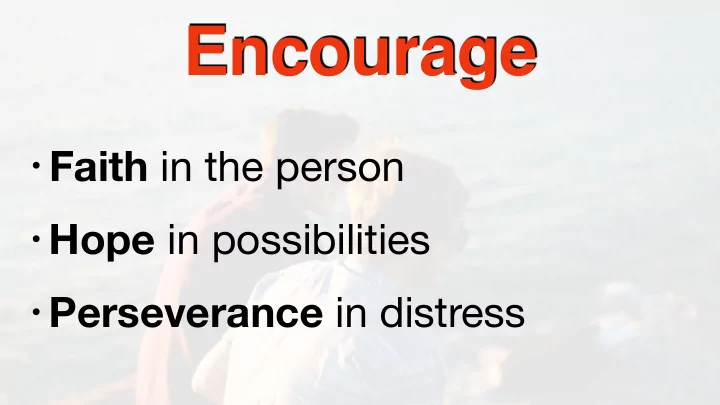

Encourage • Faith in the person • Hope in possibilities • Perseverance in distress
Share • Feelings for the person • Similar, hopeful experience • Alternatives for consideration
Support • Commit to walking with them • Go with them to get help • Check in with them
Boundaries • What do I need? • How am I being a ff ected? • What am I feeling experiencing?
Boundaries • What does the youth need? • What is the appropriate place ? • Who else might I include? • Check institutional policies .
Helping Grieving Teens
Adolescent Grief - Differences • Sudden and tragic losses • More Isolation • Need normalcy- distances grief/ identity as “grieving kid” • Turn to internet for help • Likely produce spiritual questioning • Masked by other behaviors
Adolescent Grief • Adolescents don’t grieve in the same ways adults do. • They don’t move through the linear “stages” of grief • Initial experience of grief lasting 2-4 weeks • Resurfaces as something else (grades, act out) in 9-14 months • Mark your calendar to check in - 9, 10, 12 , 18, 24 months out
Adolescent Grief • Adolescents don’t grieve in the same ways adults do. • They don’t move through the linear “stages” of grief • Initial experience of grief lasting 2-4 weeks • Resurfaces as something else (grades, act out) in 9-14 months • Mark your calendar to check in - 9, 10, 12 , 18, 24 months out
Adolescent Grief Anxious and Depressive Symptoms: • increased irritability and/or rage • decreased school performance - grades • isolation and withdrawal from people and events • beginning or increasing substance use • Panic attacks • Sleep problems
Helping Grieving Teens • Teens need each other in the immediate aftermath • Facilitate opportunities for them to gather and share • Pray with teens who are suffering and grieving • Help parents understand grief • Provide safe place for parents to gather together to process feelings of shock, confusion, sadness and powerlessness • Stay on the rollercoaster of grief even in the 3-9 month period when it feels like the ride is over—it’s not. • Reach out, ask about them/ loved one by name when others forget
What do I Say? • Rarely what we SAY to survivors or to anyone who is traumatized and grieving, but who and how we are to them. • It takes great courage to be really present to another’s deep suffering (we unconsciously want to avoid it and fix it but we can’t)
Listen & Be Present • “Just checking in. How ya doin? You’ve been on my heart. I think about (name of victim) often and when I do, my heart hurts for you. How are you holding, handling, dealing with this?” • Much of good listening and ministry of presence is showing up, shutting up and not changing the subject
Helping Grieving Teens • Provide resources, referrals to teens and parents who may need more individual assistance to process and heal. • Help teens find a way to “do” something WITHOUT glorifying or sensationalizing the victim or the event—suicide awareness, etc.
Helping Grieving Teens • Grieving teens come to you for hope and healing within your relationship • Don’t want/ expect you to fix them . They want you to walk w/ them. • Don’t want cliche’s like “God won’t give you anything you can’t handle.” • Teens know that neither you nor they understand why God allows suffering and tragedy. They ask that question wanting you to “hold” them in a safe place—in relationship.
So…what is Stress ?
Stress = The feeling you get when you feel unable to meet expectations.
What is Anxiety?
Worst Conclusions Ambiguous Data
Anxiety •Generalizes •Catastrophizes •Nebulizes
Anxiety Types • Generalized (GAD) • Social (SAD) • Separation • Trauma (PTSD) • Agoraphobia/ Spec Phobias • Panic
STRESS Synonyms • Pressure • Worried • Nervous • Overloaded • Anxious • Overwhelmed
“I just can’t take the pressure anymore. I can’t be perfect. Would people just understand that?” ~10th grade boy with GAD, stomach ulcers, premature hair graying
STRESS: When is it a problem? • Irritability • Difficulty falling asleep • Self Injury • Depression / Suicidal Thoughts • Apathy • Dishonesty
“I just can’t put another thing on my plate. It’s overflowing… all good things but they’re stressing me out.” ~11th grade boy having panic attacks
Recommend
More recommend